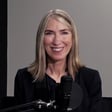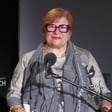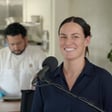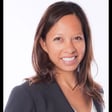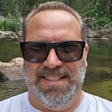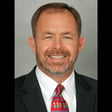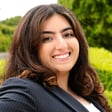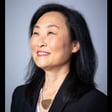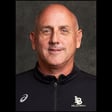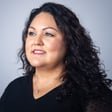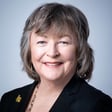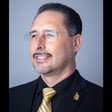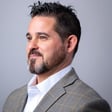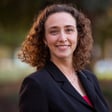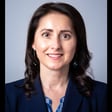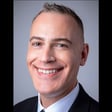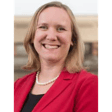Become a Creator today!Start creating today - Share your story with the world!
Start for free
00:00:00
00:00:01

Leading with Heart: Dr. Anna Ortiz on Education, Equity, and Legacy @ The Beach
Anna Ortiz, dean of CSULB’s College of Education, shares her experience leading one of the largest producers of educators in California. Dean Ortiz reflects on the strengths of our student population, her own trajectory into college and how a gift from Ballmer Group helped launch the PK-3 Education Specialist Instruction Credential Program.
Transcript
Introduction and Welcome
00:00:16
Speaker
Hello, everyone, and welcome to another episode of At the Beach, the official Cal State Long Beach podcast, where we shine a light on people and programs to make the university such a powerful force for good.
00:00:30
Speaker
I'm Dan Montoya, Vice President for University Relations and Development, and today's episode i'm really excited to bring to you.
Meet Dr. Anna Ortiz
00:00:38
Speaker
Joining me is Dr. Anna Ortiz. She's the Dean of the College of Education.
00:00:44
Speaker
Dean Ortiz is one of the rare leaders whose work truly bridges research, teaching, and heart. she spends She has spent more than 30 years helping students find their purpose in preparing educators who go on to shape communities across California and beyond. Dr. Ortiz, welcome to the show, and thanks for being with us.
00:01:05
Speaker
Thank you. So it's it's great to have you. I've been looking forward to this conversation for quite some time because your story and the story of the College of Education is really represents what's best about Long Beach.
Hispanic Heritage Month's Impact
00:01:21
Speaker
Thank you. So we just finished celebrating Hispanic Heritage Month, and it's a time to reflect, to celebrate, and to honor the many contributions of Hispanic and Latino Americans.
00:01:34
Speaker
what does this time mean to you personally, and how does it connect to the work you do as an educator and as a leader? Yeah, so I think Latinx Heritage Month is really a time for celebration and and in celebrating everything that's wonderful about all the Latinx, Latino cultures, um and if everything that comes under the umbrella Latinx or Hispanic peoples.
00:02:02
Speaker
um To me, it's a time of pride and it's a time to take stock of all of our accomplishments um and everything that makes up our beautiful cultures and our achievements.
00:02:14
Speaker
And I so much enjoy that we then get to share that pride and um cultures and celebrations with people on campus. I think it's great that we get to do that at the start of the school year. What a way to welcome more than half of our students to campus to see their culture um celebrated. So um it really is a chance for our students to see immediately that we welcome them to campus and that we have activities that they can relate to or learn more about if they're learning more about their cultures because we can't assume everyone comes to us that way. That's right.
00:02:53
Speaker
Yeah. Yeah. To me, it ah it's a very different type of um experience, and I'm off often jealous of my students, our students, because they get to come to a school that's over half Latinx, and I don't know what it was like when you went to school, but when I went to school, like I was like one of the only.
00:03:15
Speaker
Yeah. You know, so, you know, my residence hall had like two Latino people in it. When I was in high school, I was the only yeah and Latina in my college prep classes.
00:03:28
Speaker
So I'm jealous that they get to have so many familiar face faces and friends who reflect who they are. Yeah, um I think that's a very interesting perspective because, ah you know, I grew up in New Mexico and ah was really strong ah Hispanic culture.
00:03:47
Speaker
And then coming to, and you know, I joined the Navy and then landed up in San Diego and even there was emerging too. And so i don't even i don't I don't even think they were at the level that we're at, know, which is close to 50%, which is amazing.
Diversity at the University
00:04:05
Speaker
But, you know, that that also describes a lot of diversity within our campus in many different ways. But, you know, I always look at the perspective as as as one ah group rises, we can all rise, right? Oh, definitely. That's the beauty ah of having that strength in that population.
00:04:23
Speaker
Yeah, yeah, for sure. So can you talk to us about how does the College of Education help prepare future teachers and counselors to serve California's day worse diverse student population effectively?
00:04:37
Speaker
Because what you do educates, you know, provides opportunities for a lot of the teachers at all levels here in California and the region.
00:04:47
Speaker
So talk to us about that.
Preparing Diverse Educators
00:04:50
Speaker
Yeah, well, we are one of the largest producers of teachers in California. We are we always vie for maybe Fresno and Northridge in terms of the CSU that prepares the most.
00:05:01
Speaker
We prepare the most high school teachers of any institution in the state. And I take that responsibility super seriously. Like, you know, what we do with our students and how we prepare them and is preparing the next generation Yeah.
00:05:17
Speaker
um and so we do a number of things in the college to really help are students our faculty um those who are going to be teachers counselors or leaders um really understand the complexities of urban education right um so that they can walk into whichever job they're going to have currently in um ready to serve those students. And so whether it's we do a lot around culturally sustaining pedagogy,
00:05:52
Speaker
um We've had a an HSI, Hispanic Serving Institution grant, that really launched us into a deep dive in curriculum and um supporting students and doing it in a different way.
00:06:09
Speaker
So we hope that what we model for them and their class in their classrooms that they take here um ends up in their classrooms when they become teachers. And so, um you know, we we are really rely, i rely on our students to really...
00:06:27
Speaker
um take the lessons and um so they can be outstanding educators and really educate the citizenship the you know our our our new our citizens pre-K teachers as well.
00:06:40
Speaker
Yeah. ten years fifteen years um eighteen years because now we're preparing pre k teachers as well so I'm glad you mentioned that.
00:06:51
Speaker
Yeah. Talk a little bit more about that. Talk about what you're doing in that space, what you're looking to do and, you know, your successful um receipt of the Balmer partnership. and Maybe you can share a little bit about that and what you're looking to do here in the next few
The Balmer Gift and Pre-K Education
00:07:11
Speaker
years. Yeah, the um the Bomber gift is enabling us to, hey well, it enabled us to really fully develop what I think is ah a cutting-edge pre-K-3 credential so that California four-year-olds and, you know, beyond, you know, like perhaps in the future three-year-olds are going to access to universal preschool
00:07:37
Speaker
And in a quality education that really prepares them to succeed in you know grades one through three, there's a lot of research that shows that if we're not, if literacy isn't achieved by grade three, there's and there's a whole host of negative outcomes.
00:07:57
Speaker
So early education is critical. And so the bomber gift, which I think may still be the largest gift that the university has received, has enabled us to create a curriculum.
00:08:09
Speaker
um It's enabled us to hire staff. it's And now it is enabling students to have a substantial scholarship to study, which allows them um to ah live um a living wage. It allows them to ah focus on school and not have part-time employment yeah outside of school,
00:08:35
Speaker
It takes into account that many of those students have and families of their own and need to support beyond um the typical student. ah And it really is allowing us to uplift a whole group of educators and in California who have been the lowest paid educators.
00:08:54
Speaker
um And those are the ones who provide early childhood education. Yeah. So we're just getting started. We just started last, you know, in August. Yeah. And so we already had, we've took a double cohort.
00:09:07
Speaker
and We weren't expecting to double the cohort, but we had way more applications than we expected. So we took 60 students this year. That's great. They're all on bomber training. scholarships of some size. Most of them are on full scholarships, um which are about 16,000 a semester, which is huge. That's great. Yeah. and they're getting all kinds of support. They have a financial aid counselor dedicated that to them.
00:09:31
Speaker
They have an advisor dedicated to them. And we have new faculty in that program who are just centering those students. So I am just thrilled. And we're going to dig deeper into the pool out there and make sure that those early childhood educators who maybe have partially finished their bachelor's degree come to us and finish. Yeah. and then And then complete the credential. That's the ultimate goal of the Bonner program.
00:09:59
Speaker
Scholarship funds. Yeah, we're grateful for that partnership. And if there's anybody out there listening who's interested in the program, definitely look ah look ah into it because it's a great opportunity to launch your your career and in teaching yeah preschool. Yes, yes, yes. so um Definitely. So you you come across so many students throughout your career, lifetime. Is there a particular story of a student that you can think of that, you know,
00:10:29
Speaker
Really is memorable in your mind um that ah you can share about? Well, i ah one of my students, and and i and I think it's also a story of involvement and how important it is to be involved as a college student. Right.
00:10:46
Speaker
um And he came to me through the university um undergraduate research program, UROP. And so UROP places students were in research positions with faculty members, and which gives them a chance to earn, um you know, be hired by the university, ah offers them an opportunity to learn about research and to work closely with a faculty member. Right.
00:11:14
Speaker
So my ah my year up student and I don't even know how long ago it was, maybe seven or eight years ago, um John, he was with me throughout his whole undergraduate career.
00:11:25
Speaker
So he conducted research with me. He analyzed data. He conducted qualitative interviews. And then when I moved into other positions on campus, I was a co-chair for the President's Equity and Change Commission. Right.
00:11:39
Speaker
So he came with me there and um really helped launch that group and supported the group, um created the whole website, and supported all the administrative work that needed to be done.
00:11:56
Speaker
Then when I became dean of the college, he came with me to the dean's office. Wow. And continued to do some of that work. Now, you know, that at by that time, he was in his ah master's program, which he did here.
00:12:09
Speaker
So he finished his undergrad, enrolled in an MBA program, and um worked with me the whole time. um Simultaneously, he was a vice president of ASI. Okay.
00:12:20
Speaker
And so he was instrumental in the and the um proposal process. Exactly. to for the renovation of the um University Student Union and worked with them and graduated in June and now he's a full-time person with ASI. He's running pretty much that whole finance operation food but organize the moves of the whole union um and now he's talking about doing a doctorate that's awesome with us and so you know i don't know how many years in the future he's gonna do that he's gonna do that but he wants to do it here at the beach and um by that time i'll probably be coming out of retirement to be on his dissertation committee
00:13:09
Speaker
That's great. um But that's that's what you do, you know, yeah and and you watch these students. and And I know that that is one of many that you've influenced in so many ways. And so I want to switch gears to the seal of excelencia.
00:13:25
Speaker
I mean, you were instrumental in and helping this university achieve it on the first try. yeah. Because there's not, I think there's a lot, maybe 40,000 universities across the nation. Is that right? Maybe we're, we're getting close to 50 now. if They just, but at the time they were like, we were in the 30 thirties. Yeah. Yeah. Yeah. And so you were able to choose. Talk to us about that and talk to us why it's important.
00:13:51
Speaker
Yeah. Well, I was so pleased when president Connolly asked me to lead that effort, um, because, um ah Latino people are humble people. yeah And um we've all we've always known we're strong here on campus. We've always done a lot.
00:14:11
Speaker
um We have excellent programs. We have excellent staff, excellent faculty, and amazing students. But to be asked to shine a spotlight and to really learn more about all those groups in a way that is so consequential, like the Seal of Excellencia, was a tremendous honor
The Seal of Excellencia
00:14:32
Speaker
um to be asked. And, you know, my own work ethic and need for perfection was like, we're going to get that on the first try. And I promise you, President Conley, that will happen.
00:14:43
Speaker
Perfect. So we, you know, that enabled us to learn about programs across campus and initiatives. ah We are a large campus, and that's maybe, you know, I've been here for 22 years, almost 23 years.
00:14:59
Speaker
And in 2022, we were working on the SEAL application. yeah And I don't think it was until then I really realized how big we are. right You know, we're one of the largest in the country.
00:15:11
Speaker
So there's pockets of excellence everywhere. on campus And the SEAL application um gave us an opportunity to find those yeah and pull them out into the spotlight and really highlight how they serve not only Latino students, but all students. right And um serve them well where um practices, policies, opportunities result in...
00:15:35
Speaker
You know, the outcomes we all care about, like persistence and GPA and graduation, but also a host of other ones that have to do with career preparation and and really, you know, identity development and and developing a purpose and goals in life. So, yeah awesome. And i think I think that speaks to a lot of the conversations that I have with maybe donors to say,
00:16:02
Speaker
I don't think people realize how much it costs to educate a student, right? it's Tuition is just the beginning. Financial is the beginning. But there are so many other elements that come into play on the recruitment side and then and then matriculating them, creating that experience.
00:16:21
Speaker
And, you know, as they as as we know, 80% the learning happens outside of the classroom. So creating all those experiential learning along the way. And I think, you know, the seal of excellentia demonstrates that we have risen to the occasion and been able to do that and continually evolve to meet the moment, right? And so I think that is a that ah that was an excellent example of how But also you you also achieved the, ah what is it, that you were spotlighted recently as the CSUOB's Andale Latino Research Training Program as a national finalist in Excellente's Examples of Excellence Award.
00:17:06
Speaker
So tell us a little bit more about that. and Yeah. And how did that come about?
Andale Latino Research Recognition
00:17:11
Speaker
So we weren't just a finalist. We won. Right. We were the chosen program for the nation for a bachelor's level programs.
00:17:21
Speaker
And Andale is a program in the College of Health and Human Services in the Center for Latino um Health Research and Evaluation. Right. And... um They train students, about 50 students a year, on research, community-based research.
00:17:42
Speaker
They partner them with faculty members. So faculty members are in involved, so it supports faculty research. And then importantly, they're studying interventions, health interventions in the community. Right.
00:17:54
Speaker
So to try to reverse health disparities, we know, whether it's type 2 diabetes, obesity, um cancer, hypertension, all the, all the um you know, preventable diseases that, um f you know, communities that are often challenged with.
00:18:16
Speaker
So that they are, um I've known about the program. And of course, I've known about the that um center for quite a while. And i that's one of those corners of campus. there They're over, you know, kind of over there.
00:18:34
Speaker
They have their office and it it's kind of, it's not really in the basement, but it's on, you know, kind of tucked in a corner. Yeah. And they just do good work. And so their program,
00:18:47
Speaker
um they each year they exceed the number of students recruiting students into the program. And then they have 100% retention rate, 100% graduation rate, and 100% placement rate in either health-related fields or in health-related graduate programs. Mm-hmm.
00:19:11
Speaker
And how many programs have that many hundred percent? No, that's amazing. So when El Concilio, for that next success, identified Andele as a program we wanted to support and in the application for Examples of Excellencia, Andele was a no-brainer. It was like we had to do it.
00:19:32
Speaker
And, you know, with outcomes like that, we were quite certain we were going to be well-recognized. But even we were surprised to get the big the big honor. Yeah. ah So that's awesome it was great.
00:19:43
Speaker
Well, again, it just and I think you bring up a but good point to to show our listeners how big this university is and all the amazing things that are happening. That's why that's why I wanted to do this podcast to talk about all the things that we're doing. And so ah thank you for sharing that. um So.
00:20:03
Speaker
how How do we keep the momentum going and continuing to build on the se success that has earned us the seal and and these awards? Yeah. So I think we're doing a number of things. um and And based on lessons we learned in both of those. So continuing to elevate programs and and help people within the programs um and ensure that intentionality and serving us are the center of what they do.
00:20:33
Speaker
ah And not just for Latino students, for all students. um We want to support and help them evaluate and assess their programs so that they can show their outcomes.
00:20:45
Speaker
And so we're not relying on anecdotal evidence to to base funding decisions on. right So this El Concilio for Latinx Success and the um Office of Hispanic Serving Initiatives this year is is um conducting a series of um professional development workshops for staff and faculty so that they begin to do that.
00:21:08
Speaker
So we just had our second one. ah We have two more planned. And well that will allow us to improve programs.
00:21:22
Speaker
And I say improve. They're already great programs, right but they're not good at amplifying their work. And they're not good at telling their story. And they're not good at, um again, we go back to humble people. Sure.
00:21:36
Speaker
So we're just helping them and and pushing them and trying to say, let's get the good word out there. Let's put together um executive summaries so that You and other people on the president's cabinet have these in their hands when they're talking to policymakers or donors or government officials so that we can um do what we need to do to sustain the programs.
00:22:03
Speaker
You know, I know that you already know that CSULB does a great job of doing a lot of work. on modest amounts of money and but we would still like some more money yeah absolutely yeah hundred hundred percent agree yeah um i always say you know the the state is not you know go to come and save us nobody's really coming to save us anymore We had to find those opportunities that um to bring in philanthropic dollars to help these programs and helps our students be successful.
00:22:39
Speaker
And the more we talk about the impact, because a lot of donors or are those who are interested in funding students and their success, they want to know the impact. and in And we have evidence.
00:22:51
Speaker
And so that's the beauty of of what you're doing. and And like you said, the numbers speak for themselves, right? You know, it's not it's not something that we're, you know, creating out of the blue. you know, we're are actually studying these students. we're We're finding out what's working, what's not working. We're adapting.
00:23:07
Speaker
And there are things that we need to continue to add to their daily curriculum and lives to enhance that and make it better. so Yeah, yeah.
00:23:17
Speaker
and And that's what I appreciate about what you do as a dean. I mean, being a dean is not an easy job, right? You have so many departments and faculty under you, and you have to stay relevant and current on on what you do. So um I want to switch channels here to your leadership. So you've had such an incredible career from earning your doctorate at UCLA to teaching at Michigan State and leading one of the most respected colleges in our system.
Dr. Ortiz's Educational Journey
00:23:47
Speaker
What drew you to higher education? Yeah. so you know, my story is a lot like the story of our students. So my, you know, immediately I think of my dad.
00:24:01
Speaker
You know, he was and a wonderful a man who accomplished a great deal. He grew up very poor. He was an immigrant. But he ended up excelling in school and sports.
00:24:13
Speaker
And so he um that lot that connected him with the college-going families. Like, those were his friends in school, and then he played ball with them.
00:24:23
Speaker
um And so by hanging out with those college-going families in our little town that we grew up in, He saw himself as going to school just like his college, just like his friend. right He ended up being the valedictorian of his class.
00:24:38
Speaker
He earned a baseball scholarship to UC Davis. That's great. And so there was no question I was going to college. It was never a question. That's great. It's just a matter where, right?
00:24:49
Speaker
ah Yeah, now that that's a funny little story that I'm just going to share because I think ah the Latinas out there will connect with this story. Absolutely. You know, my my dad was a ah traditional Mexican. We eventually got him away from that.
00:25:03
Speaker
ah to lead a more enlightened ah view on the world. But, ah you know, he didn't want his oldest daughter going away to school. And so um I could only apply to UC Davis. It was about 15 miles from our house.
00:25:19
Speaker
And I, you know, I got in and and that was all good. That was what I was supposed to do. But I thought, I'm not living in Vacaville anymore. I need to move. I'm living on campus. Right.
00:25:32
Speaker
My parents had grown up in Vacaville. I had some of the same teachers they had in high school. like Oh, really? I needed a change. well Get out of there. I needed to get out. So my mom, behind my dad's back, wrote a check to the house for my housing application.
00:25:48
Speaker
And so I got into housing, and he wasn't very happy. And, you know, he's like, well, you're going to have to pay for that. And I'm like, I will pay for it. and And that really changed everything.
00:26:01
Speaker
Like my mom's action. um i lived on campus. I became a student leader. I was a resident advisor. I was an academic peer advisor. yeah I worked in a research lab.
00:26:13
Speaker
Like all the things we want students to do. right right And at that time, and Davis still is, it's called an involving college. yeah and There were higher ed leaders who worked in student affairs there.
00:26:26
Speaker
And they were great women tours to me. And um so if I hadn't lived in those residence halls, if my mom hadn't rit wrote that check, I don't know what my career would have been like.
00:26:37
Speaker
Because I fell in love with college. i went at 18 and I've never left. That's great. I'm so glad you shared that story. Because when we have like Bienvenida, right? or these other programs where we bring the students in and their families to campus,
00:26:56
Speaker
There's still that kind of mentality. Oh, yeah. i It's like they they are like you need to work and help the family. Right. yeah and And we have to help them understand that when you invest in your students education, you actually get more return on that.
00:27:12
Speaker
yeah And on the back end, because if you allow them to get their education, they can help the family even more. right Right. And I think that is what we have to impart to all our students and their families because it's not just the Latine community. It's other other ethnicity and and their families as well because they have similar cultural norms like we do, right? he' so and i'm And I'm like you. I grew up in a small town and And for me, was the Navy that took me out of there.
00:27:42
Speaker
And i I left at 18 and never went back. and and And I was able to educate myself and, ah you know, have an education of the world and and learn cultures and all that. But um you're absolutely right. And so I'm so glad that your mom...
00:27:57
Speaker
took that chance and did what had to do. it Otherwise, you would never be sitting here. Who knows where you could... Yeah, no. My whole career has been higher ed. I studied college students. have studied college students. I worked in student affairs before I was ah professor. And so... Yeah, that's yeah great. yeah So now that you, you know, you've you've been the dean for a while,
00:28:17
Speaker
what What leadership lessons have you learned in that process?
Leadership Lessons from Dr. Ortiz
00:28:21
Speaker
um and And what what are the some of the things that you ah take from your experiences and and continue to develop in your leadership style?
00:28:32
Speaker
Well, I think... um You know, I've always been someone, I'm ah i'm a starter. So I like to start things. I like to build things. So so um I was one of the people who built the EDD program. So that was our first doctoral program here. yeah I was one of the first, I mean, one of the first... um Co-chairs of the President's Equity and Change Commission. i i um you know, created Concilio, you know, with Eduardo for Latinx success. And so I love to start things. I've done that in my professional associations.
00:29:09
Speaker
So to come into a college as a dean has taught me a lot of things about leadership that I didn't necessarily know. I didn't need to start a college. Right. The college was already there. That's right. That's right. um But the way my mind works and the way my work ethic is and the way I think is all about possibilities. Yeah.
00:29:28
Speaker
So I can't look at problems and not do something about them. i can't look at structures and not do something about them. I'm always thinking about how can i make things work better for students?
00:29:41
Speaker
and And how do we center students in all of our work? right And and so That has been a leadership lesson that I have loved sharing with my college. Now, we're the College of Education. We should always be student-centered. right But um it's different thinking about faculty being student-centered to everything being student-centered. Like, how are we using our space?
00:30:10
Speaker
Is it the best in the best interest of students? Right. Are we creating welcoming spaces for students? right Right. Do our programs and our staff support students? So all of the student-centeredness is really a cornerstone of my leadership style. and Then I think the other thing is um that I don't think people think a lot about us as a leadership trait or quality or skill to aspire to is is vulnerability. Yeah.
00:30:40
Speaker
Because it's connected to so many things. It's connected to being able to publicly admit mistakes and um and then work to improve. So for me to be in a continuous learning process, right um it means that...
00:30:58
Speaker
um i can I can take chances. I can take risks. Right. and be able to be okay with making those mistakes. we It's hard to take risks and be mistake-free.
00:31:13
Speaker
Yeah. 100% agree. 100% agree. And we don't move forward unless we take risks. Yeah, I mean, and that's another thing that students um should learn, right? Failure is part of the process.
00:31:25
Speaker
Yeah, because as you go through your journey, I know for me, ah I failed more times than I succeeded, but it's because of my failures that I succeeded. Yeah, yeah. And so that's that's a good um lesson to impart to our students.
00:31:40
Speaker
So... With that, what advice do you have for students coming through the process now, you know, coming to the university as a freshman from a similar background like you or a transfer student trying to navigate themselves or yeah particularly for College of Ed, right?
00:31:59
Speaker
What advice do you have for them to navigate their journey and to make the most of it? Yeah. So, I mean, I think about my own story and I think about John's story. Right. and The student I talked about earlier.
00:32:12
Speaker
and And that is getting involved um and spending time on campus. so it's making friends in your classrooms. It's easy. i mean, and that's not easy. It's not easy to make friends. Right, right.
00:32:24
Speaker
um But that's where you start. Or getting to know your faculty members. um It's scary to go to office hours for the first time. um I had that undergraduate research experience early in my career.
00:32:37
Speaker
So I was used to being around faculty because I was in a lab working with faculty. So when I started taking classes, it felt okay to approach faculty because I had already had some familiarity with them. Mm-hmm.
00:32:48
Speaker
um Most faculty don't bite. And so, ah but and they're really thrilled, I think, mostly to help students. That's why they're here. Right. Because there are other places they could be.
00:33:01
Speaker
um i came to Long Beach because I wanted more connection with students. And so... ah But, you know, we have so many things to be involved with on campus. And so whether it's involved in leadership positions or research um or internships, service learning, um or, you know, right now the the university union is down. yeah um My office is closer to the library and I have a lot of meetings in the library.
00:33:30
Speaker
And I love going in there now. It is packed jam, filled with students. That's right. And they are talking with each other. It's not quiet at all. um But they're building community there.
00:33:42
Speaker
And so community is so important. And so it really is just putting yourself out there and know that not everything is going to work. and That's right. But you find those couple of places that where you really...
00:33:55
Speaker
connect and feel like you belong and it's going to make all the difference. I just, you know, feel like, like you don't need a whole bunch of things. That's right. You just need a couple things.
Advice for New Students
00:34:05
Speaker
That's awesome. And, uh, you know, and then I guess the other thing I would say is like, I, my experience with students is they, they sit with things that they're struggling with for too long. Right.
00:34:17
Speaker
And so when you begin to struggle, ask for help. Yes. Good advice. Yeah. That's good advice. So,
00:34:27
Speaker
You run this college, and there's always demand for additional resources. How do people support the programs that you're working on?
00:34:39
Speaker
If somebody were to say, how can I help? What philanthropic support can I give you? What are the areas that you need support for? and how could they interact with you or your development person?
00:34:55
Speaker
Yeah. so you know, we have a huge effort in the College of Education right now um i on student, alumni, and educator engagement and trying to connect those three groups of people together. But for our students, our so our College of Ed students are different. We're two-thirds post-bac or graduate students.
00:35:17
Speaker
So that means two-thirds of our students attend school ah four o'clock and after. So they're not here during the day right um when a lot of services are are open. A lot of services close at five, you know, regular business hours.
00:35:32
Speaker
um Even some, you know, food options aren't here as many in the nighttime for our students. And our undergraduate students for when I came into the college, they didn't even even know where they were that they were in the College of Education. They didn't know where the College of Education was because their classes are all over campus. Right. mean, we're a large campus. That's right. And the College of Education is up on 7th Street. So you have to climb the hill and walk all the way to the end of campus, yeah which is you know opposite of where they park.
00:36:00
Speaker
so sorry That's right. That's right. And so we started doing, providing lunch lunches for our liberal studies students, which are undergraduate students, to in the College of Ed so that they would come. We created a student engagement center.
00:36:14
Speaker
We brought our advising group, um all of our advising units together in one place so that students knew that way they where their home was. Right. And we've done a lot with a little. We've had um a wonderful but philanthropic gift to help support that. But with more support for our engagement efforts, we can bring alumni back in. That's right. and We can do more with our educator community.
00:36:43
Speaker
i would love for us to be like the professional development place for our local districts. That would great. And we would be thrilled to have philanthropic support for that.
00:36:55
Speaker
um Even the the Dean's Excellence Fund, which is something I'm working on building, um allows me kind of unrestricted access to our funds that are unrestricted so that when we have great ideas, we can incubate them. Yeah.
00:37:12
Speaker
To the point where we have outcomes that we can show and then take to for larger gifts or or grant opportunities outside. So I'm always pushing for that.
00:37:25
Speaker
um And through that and some other endowment funds, we started last two years ago what I call funding faculty passion projects. Mm-hmm. And it's not faculty research. That's not very, a lot of people don't like to give money to fund faculty research. and I understand that.
00:37:45
Speaker
But... College of Ed faculty are our Ed faculty because they care about students. They care about their communities. And so we've been able to fund super creative projects, like one that we fund now is part of the Think Beach Project, which is a project that brings ah young adults with intellectual disabilities into the college environment. They take classes. They get support. They have both peer mentors and faculty mentors.
00:38:17
Speaker
And through that fund, we're able to provide um a halftime graduate assistant for the directors right so they don't have to do all the work themselves.
00:38:28
Speaker
and We have another project where we're supporting faculty and bringing faculty critical issues in our local school districts and school district and students into the college so our students and faculty can learn from them.
00:38:46
Speaker
And so these projects we are able to do, and it means so much to faculty when they you say, yeah, we can fund that project for $10,000, $15,000 for you to to do that this year because it adds to their satisfaction and their commitment, which just you know, filters down to their students and then their students become involved in those. Yeah, that's wonderful. And again, i think the student's excellence fund, I mean, the dean's excellence fund, a lot of people think it's, you know, it's a fund money for the dean, but that's not true.
00:39:22
Speaker
There are many gaps that need ah funding. And a lot of times there's emergencies from students that need immediate attention.
00:39:33
Speaker
And I think ah through that fund, you've been able to do that. And then also, you know, all those other opportunities are valuable. And if we want to create future teachers and ah leaders in the community, get again, giving them that outside the classroom experience is very critical and important. So So if you are interested in supporting the College of Education, we'd love to talk to you. Yes.
00:40:01
Speaker
And we will we definitely put you in touch with the right people. Yeah, yeah. So is there any other words of wisdom or anything else you would like to share before we wrap up today?
Public Trust in Higher Education
00:40:15
Speaker
Well, i I mean, I really think that we... do so many wonderful things here, not just in the College of Ed, but on campus. And I think we're at a time in higher ed right now where um we're asking for the public to trust that we are using every dollar wisely and that we are doing the best on behalf of students. Yeah.
00:40:40
Speaker
And I think that the message that I would leave is that, you know, I have been at many big schools. I've been at Ohio State. I've been at Davis. I've been at UCLA. I've been at Michigan State.
00:40:54
Speaker
um And I can't think of a better place to invest your resources, whether they're public resources, private resources, fill um or philanthropic organization, you know, like Bomber or other organizations, than the beach.
00:41:14
Speaker
I know that as I look at my planned giving and how I give my money, um you know, I want to make sure it's used well. yeah And we can get, you can get, I can guarantee that in the college of it. Yeah. No. And, and, and you're absolutely right in that sense where your money goes a long way here. It does. And and it impacts many students, many more than some of these larger institutions, because ah in our cost is a lot more moderate than some of these other folks. But,
00:41:47
Speaker
ah The impact of the students and watching them walk across the stage and be successful. And some of them are first, many of them are first generation students and who will change the trajectory for their families, which is
Impact on a Family
00:42:00
Speaker
phenomenal. Huge. It's huge. It affects their siblings. It can affect their parents. I know.
00:42:05
Speaker
You know, just one more little short story. Yeah, sure. um One of our one of my favorite students, and his name is Chris. He's now a he's now a ah counselor. I think he's the ah department chair at his community college. So he he chairs the counseling department.
00:42:22
Speaker
And so he he graduates from our master's program. And ah pretty soon, maybe a couple of years after him, a young woman comes into our program.
00:42:34
Speaker
They end up getting married. ah So there's a double alum family right there. yeah A couple of years after that, his younger sister comes into the master's program. She graduates from the master's program. He's a community college counselor now.
00:42:49
Speaker
Then his mother oh wow retires from her career with a telecommunications company, yeah comes back and finishes her degree here. Wow. um I work with her. we get her she gets she um goes to Berkeley. She went to she transferes she went from the community to college to Berkeley.
00:43:10
Speaker
wow And I hooked her up with the but the yeah vice president of student affairs there who I went to school with. He helped her get established. She came back here and completed her master's degree.
00:43:23
Speaker
So we there we have one family that has four master's degrees. And ah Maria, um the the why the um wife of Chris, is now um finishing her doctorate with us.
00:43:40
Speaker
So that's a whole family yeah of Garcias who have just done amazing work here. That's awesome. What a great story. love that. Yeah, I love that. Well, that's a great way to to finish. um Dean Ortiz, thank you for all the work that you do, for helping to prepare our students to go out there and be amazing, be successful.
00:43:59
Speaker
And then also for your partnership in in helping our Latinae community and all the things we do, because I know we... I see the work that you do. I interact with that as well. And I definitely support um what you're doing. So thank you. We appreciate that. yeah i'm sure I also want to thank Michael Sullivan, who's behind the camera, who helped produce this.
Closing Remarks
00:44:20
Speaker
He's been amazing. It will be on YouTube and Spotify. And so we encourage you to go and and listen to this podcast. Not once, but a couple times.
00:44:31
Speaker
and And we ask for your feedback, too. We want to know other stories that you're interested in hearing because there's many. But for today, the College of Education is doing great things, continues to do great things. And we're so excited for for the future of the College of Ed under your leadership. So thank you. Thank you so much. So I'm Dan Montoya, Vice President for University Relations and Development. Together, we're building pathways of opportunity and success.
00:44:57
Speaker
ah One student, one story, and one future at a time. So thank you so much. We like to finish our podcast with a Go Beach on 3. All right. One, two, three.
00:45:08
Speaker
Go Beach. Go Beach.
